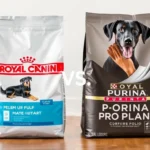
Introduction
Overview of Dog Nutrition
A balanced diet is crucial for the overall health and well-being of your dog. Just like humans, dogs require a variety of nutrients to thrive, including proteins, fats, carbohydrates, vitamins, and minerals. Unfortunately, some dogs struggle with being underweight, which can lead to numerous health complications such as weakened immune systems, lethargy, and reduced organ function.
Purpose of the Article
This article aims to educate pet owners about the best dog foods for weight gain. By understanding the nutritional aspects and factors to consider when selecting food, you can help your furry friend achieve a healthier weight.
Understanding Dog Weight Management
Why Weight Matters for Dogs
Maintaining a healthy weight is crucial for dogs, as both obesity and underweight conditions can pose serious health risks. Underweight dogs can suffer from malnutrition, which affects their energy levels, immune function, and overall quality of life. Conversely, obesity can lead to diabetes, joint problems, and heart disease. Therefore, striking a balance is key to a dog’s health.
Signs Your Dog Needs to Gain Weight
Identifying whether your dog needs to gain weight can be determined through visual and behavioral indicators.
- Visual Indicators: A clear sign is the visibility of ribs and spine. An ideal dog should have a slight waist and minimal fat covering the ribs.
- Behavioral Signs: If your dog exhibits lethargy, lack of energy, or seems less playful than usual, these may be signs that they need to gain weight.
Nutritional Needs for Weight Gain
Macronutrients Essential for Weight Gain
When considering the best dog foods for weight gain, focusing on macronutrients is essential.
- Proteins: Proteins are vital for muscle growth and repair. High-quality protein sources include chicken, beef, fish, and eggs.
- Fats: Healthy fats are essential for energy and can help dogs gain weight. Omega-3 and Omega-6 fatty acids, found in fish oils, flaxseed, and chicken fat, should be included.
- Carbohydrates: While not the primary focus for weight gain, carbohydrates provide quick energy. Options like brown rice and oats can be beneficial.
Vitamins and Minerals
In addition to macronutrients, essential vitamins and minerals play a crucial role in a dog’s overall health. Vitamins such as A, D, E, and B-complex, along with minerals like calcium and phosphorus, are important for maintaining healthy bodily functions and supporting weight gain.
Factors to Consider When Choosing Dog Food for Weight Gain
Age and Size of Dog
Different life stages have varying nutritional requirements. Puppies need more calories for growth, while adult and senior dogs have different metabolism rates. Additionally, small breeds may require different formulations compared to larger breeds.
Activity Level
A dog’s activity level significantly affects its caloric needs. Highly active dogs may require more calories to maintain their energy levels, while less active dogs may need a more balanced approach.
Health Conditions
Always consult with a veterinarian when selecting food, especially if your dog has underlying health issues that may affect their ability to gain weight. Conditions such as hyperthyroidism or gastrointestinal disorders can impact nutritional needs and weight management.
Types of Dog Foods for Weight Gain
Commercial Dog Foods
High-Calorie Kibble
High-calorie kibble options are specifically formulated for weight gain. These brands typically contain a higher percentage of protein and fat.
- Recommended Brands: Some popular brands include Victor Hi-Pro Plus, Blue Buffalo Life Protection, and Canidae Pure.
Wet Dog Foods
Wet foods can also be advantageous for weight gain due to their moisture content and palatability. Many dogs find wet food more appealing, which can encourage them to eat more.
- Suggested Products: Look for high-calorie options like Wellness CORE Grain-Free or Merrick Grain-Free.
Raw and Homemade Diets
Raw feeding can be beneficial for weight gain, as it often includes richer, more natural ingredients. Homemade diets can also be tailored to meet your dog’s specific needs.
- Easy Homemade Recipes: Consider cooking lean meats, vegetables, and healthy fats together. A simple recipe could include ground beef, sweet potatoes, and carrots mixed with fish oil.
Supplement Options
High-calorie supplements and treats can enhance your dog’s diet. Look for nutritional additives like fish oil, peanut butter, or cottage cheese to boost calorie intake.
Top 10 Best Dog Foods for Weight Gain
- Brand A – High-Calorie Kibble
- Nutritional Breakdown: 30% protein, 20% fat, high in calories
- Pros: Easy to feed, highly palatable
-
Cons: May not be suitable for all dog breeds
-
Brand B – Grain-Free Wet Food
- Nutritional Breakdown: 28% protein, 15% fat, low in fillers
- Pros: High moisture content, encourages hydration
-
Cons: Higher cost compared to kibble
-
Brand C – Raw Diet Option
- Nutritional Breakdown: 35% protein, 25% fat, balanced nutrients
- Pros: Natural ingredients, highly digestible
-
Cons: Requires careful handling and preparation
-
Brand D – Prescription Weight Gain Food
- Nutritional Breakdown: 32% protein, 22% fat, specifically formulated for weight gain
- Pros: Vet-approved, targets underweight dogs
-
Cons: Needs a veterinarian’s prescription
-
Brand E – High-Protein Snack
- Nutritional Breakdown: 40% protein, 15% fat, nutrient-dense
- Pros: Great for training, adds extra calories
-
Cons: Can be pricey
-
Brand F – Freeze-Dried Raw Formula
- Nutritional Breakdown: 38% protein, 20% fat, minimally processed
- Pros: Retains nutrients, convenient storage
-
Cons: Requires rehydration before feeding
-
Brand G – Organic Dog Food
- Nutritional Breakdown: 30% protein, 18% fat, made with organic ingredients
- Pros: Health-conscious choice, no artificial additives
-
Cons: Higher price point
-
Brand H – Fish-Based Formula
- Nutritional Breakdown: 33% protein, 20% fat, rich in Omega-3 fatty acids
- Pros: Beneficial for skin and coat health
-
Cons: Some dogs may not like the fish flavor
-
Brand I – Beef-Based High-Calorie Food
- Nutritional Breakdown: 32% protein, 25% fat, calorie-dense
- Pros: Rich flavor, appealing to many dogs
-
Cons: May not be suitable for dogs with beef allergies
-
Brand J – Homemade Recipe Kit
- Nutritional Breakdown: Varies based on ingredients, customizable
- Pros: Tailored to specific dietary needs
- Cons: Preparation time required
Feeding Guidelines for Weight Gain
Establishing a Feeding Schedule
To promote weight gain, establish a regular feeding schedule. Gradually increase portion sizes and frequency; feeding two to three times a day can help your dog consume more calories.
Monitoring Weight Progress
Regularly monitor your dog’s weight by checking their body condition score and adjusting their diet as needed. Keeping track of weight changes can help ensure that your dog is on the right path toward healthy weight gain.
Common Myths About Dog Weight Gain
Myth 1: All dogs need the same diet
Dogs have unique dietary needs depending on breed, age, health condition, and activity level. Customizing their diet is essential for optimal health.
Myth 2: High-fat diets are unhealthy for all dogs
While excessive fat can lead to obesity, healthy fats are necessary for energy and weight gain. It’s all about balance and the right types of fat.
Myth 3: Weight gain is solely about food intake
Weight management is a multifaceted issue that also involves exercise, metabolism, and overall health. Simply increasing food without considering these factors may not yield the desired results.
Conclusion
Recap of Key Points
Proper nutrition is vital for helping underweight dogs gain weight. Understanding your dog’s unique needs regarding macronutrients, age, activity level, and health conditions can guide you in choosing the best dog foods for weight gain.
Encouragement to Consult a Veterinarian
Always consult your veterinarian for professional guidance tailored to your dog’s specific circumstances. They can help monitor health and adjust dietary needs as necessary.
Final Thoughts
A balanced approach to dog nutrition and weight management is essential for your furry friend’s long-term health and happiness. By choosing the right foods and monitoring progress, you can help your dog achieve a healthy weight and lead a vibrant life.









